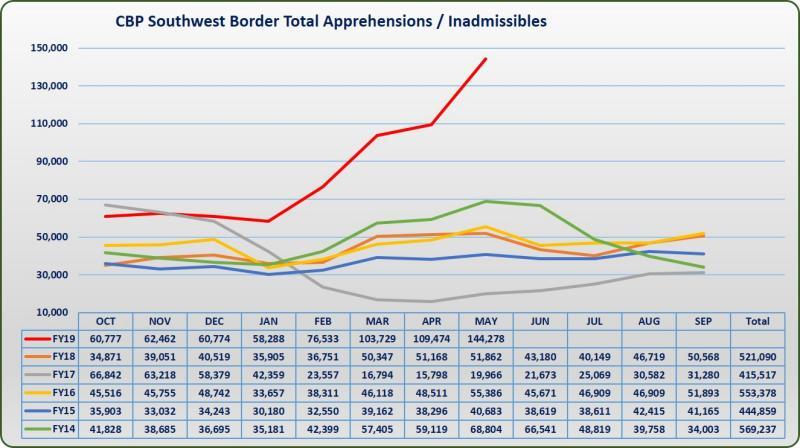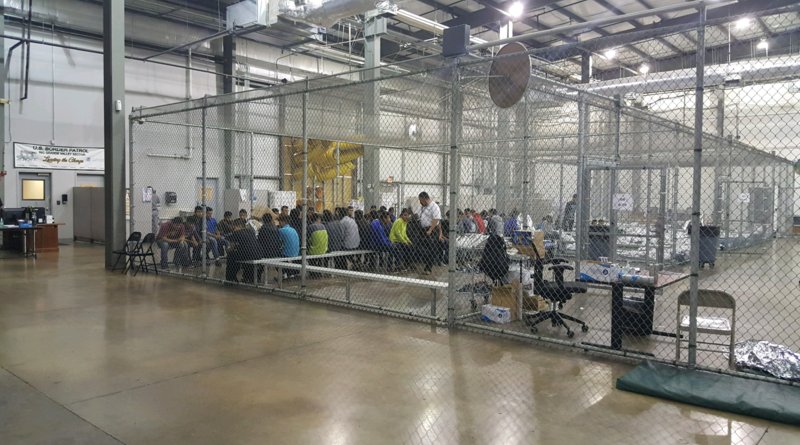Crisis At The US Border – Analysis
US border policies, prolonged detention of migrants, attempts to criminalize documentation of human rights violations, draw international condemnation.
By Susan Froetschel*
Donald Trump and his supporters view illegal migration as a leading economic and security threat for the United States. The administration has taken a tough – others say cruel – approach on illegal entries at the Southwest border with the hope of deterring migration.
The number of entries spiked in 2019, with US Customs and Border Protection apprehending about 600,000 immigrants – more than half are families – from January to May. Apprehensions for the year are more than double those for previous years since 2014, and the government places hundreds of men, women and children each month in temporary holding facilities, described as “concentration camps” by US Representative Alexandria Ocasio-Cortez.
The facilities are under increasing scrutiny. Congressional representatives who have toured the facilities describe the conditions as horrific with overcrowding and parents frantic over health issues and the whereabouts of their children. The detainees at some facilities report limited meals and no access to clothing, showers, toiletry supplies and activities. Guards have rejected community volunteers who tried to deliver supplies, prompting introduction of legislation in Texas requiring detention centers to accept donations. The incoming president of the American Academy of Pediatrics toured two facilities. “When they opened the door, the first thing that … hit us was a smell,” said Sara Goza. “It was the smell of sweat, urine and feces.”
Trump administration officials dismiss the complaints, but the Office of Inspector General for the Department of Homeland Security issued a management alert in May, with photographs, about facilities for migrants who crossed into the US southwest border region of the Rio Grande Valley. The inspections of five holding facilities and two ports of entry were unannounced.
One senior manager called the overcrowding a “ticking time bomb,” and the alert describes “urgent issues that require immediate attention and action”:
● People are kept in chain-link pens, with concrete floors, no bedding, and little room to walk or lay down.
● US agencies, including Health and Human Services, are operating at overcapacity. Overcrowding leads to an escalation of security concerns. At one facility, adults were held in standing-room-only cells for a week.
● Customs and Border Protection is prepared for short-term detentions, 72 hours, allowing processing and transfer to better equipped agencies. Short-term detentions can stretch into weeks.
● Escape attempts are reported.
● Standards require showers within 72 hours for those in CBP custody, but some detainees go a month without showers.
● Upon seeing inspectors and visitors, the detainees “banged on the cell windows, shouted, pressed notes to the window with their time in custody….”
● Security concerns have emerged. “We are concerned that overcrowding and prolonged detention represent an immediate risk to the health and safety of DHS agents and officers, and to those detained.”
● Conditions for children separated from parents are dire: “While all facilities had infant formula, diapers, baby wipes, and juice and snacks children, we observed that two facilities [of five] had not provided children access to hot meals – as is required by the TEDS standards – until the week we arrived. Additionally, while the Border Patrol tried to provide the least restrictive setting available for children (e.g., by leaving holding room doors open), the limited space for medical isolation resulted in some UACs and families being held in closed cells.”
The Department of Homeland Security responded, describing the southern border as “an acute and worsening crisis.” The Office of Inspector General urged more resources and faster transfers to more permanent facilities. Officials also pointed out that border agents had rescued more than 3400 people since October 2018.
But government administrators may not want more resources to aid migrants. Jim Crumpacker in a DHS response, noted: “without Congressional action to address legal and judicial loopholes, families and [unaccompanied alien children] will continue to be incentivized by the smuggling organizations to make the dangerous journey and be encouraged by the likelihood that families will not be detained during their immigration proceedings.”
Amnesty International also released a report describing “an unlawful and politically motivated campaign of intimidation, threats, harassment, and criminal investigations” targeting any who try to defend the human rights of migrants and asylum seekers – including activists, lawyers, journalists, and volunteers. The goal, notes Amnesty International, is to end the documentation of systematic human-rights violations committed against migrants and asylum seekers.
US officials, by urging consequences for migrants, have encouraged systemic human rights violations, suggests Amnesty International, and inspired activists to document the abuses: “by discriminatorily targeting human rights defenders – most of them US citizens – based solely on their political or other opinions, speech and activities, the Trump administration has violated international law, the US Constitution, US laws, and corresponding DHS policies that acknowledge those legally binding civil liberties protections,” notes the Amnesty International report. “Under international law, the US government plainly violated the human rights defenders’ freedom of expression; right to privacy; equality under the law; and freedom from discrimination, including on the basis of political or other opinion. In doing so, authorities may also have indirectly violated the human rights of migrants and asylum seekers, by undermining their access to asylum procedures and life-saving humanitarian aid. Under international law, it is also unlawful for US authorities to criminalize humanitarian aid.”
According to the Amnesty report, the legal justification by the Department of Homeland Security for targeting human rights defenders: “encouraging” or “inducing” smuggling and illegal border crossings by asylum seekers.

Migrants are fleeing poverty and violence in El Salvador, Honduras and Guatemala. The combined population for the three countries is about 35 million, representing a little more than 10 percent of the US population. The GDP per capita is about $4500 for El Salvador and Guatemala, and less than $2500 for Honduras. Canada and the United States issue travel advisories on the countries. Violent crime and murder are common, along with drug trafficking, transnational organized crime and street gangs, while police lack resources to investigate or prosecute crimes. “As a result, criminals linked to organized crime operate with a high degree of impunity,” notes the Canadian government. The World Bank reports homicide rates are among the highest in the world, challenging commerce and investment, and civil society groups point to under-counts in official tallies.
Fertility rates fell with the World Bank reporting 2.1 children per woman in El Salvador, 2.4 in Honduras, and 2.9 for Guatemala – all in 2017. Honduras and Guatemala are among the countries with the highest population density in the world. Unemployment hovers at 7 percent for El Salvador and Honduras and 2.8 percent for Guatemala. The poverty rate, largely tied to corruption, according to the Borgen Project, is about 60 percent for Guatemala and Honduras and about 40 percent for El Salvador.
In November, the United Nations expressed concern soon after US agents used teargas to disperse migrants at the Mexico border. Nine experts sent letters to the governments of Guatemala, Honduras, Mexico and the United States, reminding each that migrants are vulnerable, facing shortages of basic supplies such as food, water and shelter. “Rather than fueling tensions with hate speech and threats, Governments should work together to tackle inequality, poverty, social exclusion, violence, insecurity, environmental degradation and persecution as the main drivers of migration in Central America,” nine experts wrote, emphasizing that reliance on military force will not solve the problems. “Experience shows that when armed forces are used to perform tasks that they are not trained to do, this usually leads to serious violations of human rights.”
The conditions are inhumane for the migrants as well as government personnel and contract staff working at such centers. The best course for the United States is to ensure sufficient aid for Central American countries linked to incentives to end corruption, oversight over agencies responsible for migrants, transparency for border operations, and acceptance of volunteer specialists who provide services to this vulnerable population. Otherwise, so much chaos, neglect and mistreatment is a recipe for bitterness, resentment, violence and perhaps even terrorism.
Read the report from the Office of Inspector General of the US Department of Homeland Security.
*Susan Froetschel is editor of YaleGlobal Online.

